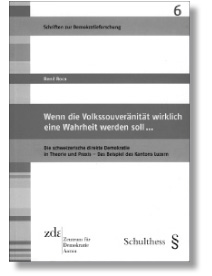No end of history!
No end of history!

by Dr phil René Roca, high school teacher for history and head of the Research Institute for Direct Democracy
In the Canton of Basel-Stadt the Curriculum 21 was introduced in the 2015/16 throughout kindergarten, primary, and secondary school. On secondary level this also included combined subjects. In the future, instead of history and geography, there will be a combination of “Räume, Zeiten, Gesellschaften”, RZG (Spaces, Times, Societies) and instead of biology, physics and chemistry “Natur und Technik” (Nature and Technology). As a historian, I concentrate on the RZG. What I explain in the following section by means of the subject history is exemplary for all combined subjects. I would like to emphasise that I am as a high school teacher who “inherits” what primary and secondary school achieves, but these schools as a whole unit matters for me. It lays the central foundation for our direct democratic political system.
The value of the subject curriculum
Preliminary it should be noted that the value of the traditional, historically grown subject curriculum cannot be emphasised enough. It is a fruit of our scientific history. The result was a structure of knowledge that is immediately apparent in schools, but also in libraries and universities. Knowledge therefore is not a hotchpotch and cannot be “compiled” under whichever concept. Interdisciplinary work is only possible when structured basic knowledge is available. Especially at secondary level, it is necessary that historical knowledge is steadily conveyed.
A fact sheet1 of the Department of Education Basel-Stadt claims the opposite in October 2016. Concerning the combined subjects it stated: “The subjects combining approach of disciplines aims at an alienation from the thinking in categories of single lessons and topics. The specialist disciplines are therefore committed to cooperate interdisciplinary. The experience realm of children and adolescents is not divided into disciplines […].” Certainly, the latest version of Curriculum 21 shows that within the combined subject RZG the distribution of geography and history has largely been retained. Instead of chronology and systematic structure, only subject areas or topics are listed, for instance “Understanding Switzerland in tradition and change”. In the current RZG of Basel curriculum, however, this topic is not envisaged. This means that within teaching history is only recognisable in individual fragments whose weighting – apart from a few binding contents – is not defined, but is placed at the discretion of the individual teachers.
It is fatal to forgo the value of the concept of “history”, since one renounces the specificity of thinking historically. If a thematic approach to history is made primarily, the result is a loss of awareness in terms of chronology and orientation in time.
Historical consciousness and historical thinking fall by the wayside.
History has important integration functions
In several statements, the Schweizerische Gesellschaft für Geschichte, SGG(Swiss Society for History), as an organisation, which represents Swiss historians, demanded the uninterrupted conduction of history as a 2-lessons subject at secondary schools. Otherwise, knowledge of historical contexts would be increasingly lost: “However, precisely this knowledge is of crucial importance to judge and understand the political structures of Switzerland.” SGG further points out: “The imparting of historical and political knowledge about Switzerland also plays an important role, in a society in which many young people have immigrated into Switzerland, respectively no mediation of this knowledge can be expected from their immigrant parents. History provides the necessary individual and societal orienting knowledge on which integration processes can be built upon.” This also applies in particular to the Canton of Basel-Stadt!
Resistance to the abolition of the “history” of teachers, lecturers, experts (including a petition signed by over 1000 people) did not bear fruits. RZG is now introduced in Basel, with a reduction of the number of hours from four to three lessons. Now everything depends on the teachers of secondary level, who are struggling infinitely and are once again frustrated with good reason. The ultimate sufferers are the pupils.
Stop nonsense of combined subjects!
In the canton of Basel-Stadt, no serious revision of the last major school reform (OS, WBS, etc.) took place. Curriculum 21 is now introduced at all levels. Basel is one-eyed presented as a “pioneering canton”, and the problems are swept under the table. Now the next reform disaster is to be coming. In terms of RZG, there are serious deficiencies: there are no teaching materials (not even in planning); training and education is often massively lacking practical relevance and overly theoretical; FHNW School of Ecucation in Basel offers individual modules, but there is currently no separate training for RZG; it is only in autumn 2017 that the first training at the FHNW starts; so that the first FHNW graduates for RZG are available at the earliest in six years. The current solution of the Cantonal Department of Education (ED) for this problem: Two and/or non-specialist teachers are allowed to teach RZG. It is not too late to stop this nonsense!
The resistance against combined subjects as part of the Curriculum 21 is becoming ever wider. The Canton of Basel-Land has already achieved by an initiative, which has been accepted at the ballot box that individual subjects keep preserved at secondary level. In various other cantons combined subjects are questioned. Other elements of Curriculum 21 will also be so in the light of pedagogical practice. •
1 <link https: www.edubs.ch unterrichtlehrplan volksschulen einfuehrung-lehrplan-21 faecher-und-fachbereiche faktenblatt-geschichte-und-geografie-in-den-fachbereichen-nmg-und-rzg at_download file>www.edubs.ch/unterricht/lehrplan/volksschulen/einfuehrung-lehrplan-21/faecher-und-fachbereiche/fact-sheets-zu-ausgewaehlten-bereichen/faktenblatt-geschichte-und-geografie-in-den-fachbereichen-nmg-und-rzg/view
(Translation Current Concerns)